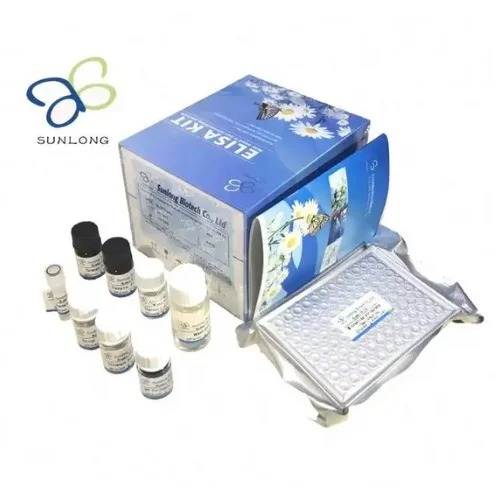Human Cytochrome C, Cyt-C Elisa Kit, 96-Tests Per Kit
Catalog No :
CAS Number :
Brand :
In Stock
Specifications:
| Application | ELISA-Based Assays |
| Storage Temperature | 2-8°C |
| Product Type | Elisa Kit |
| Product Brand | SUNLONG BIOTECH |
| Product Grade | Molecular Biology |
Human Cytochrome C (Cyt-C) ELISA Kit
The Human Cytochrome C (Cyt-C) ELISA Kit is a sensitive and specific assay designed for the quantitative detection of Cytochrome C levels in human serum, plasma, culture media, and other biological fluids. This kit is ideal for research on apoptosis, mitochondrial function, and oxidative stress-related disorders.
Sample Preparation
1. Serum Preparation
- Collect whole blood and allow it to clot at room temperature for 10–20 minutes.
- Centrifuge at 2,000–3,000 rpm for 20 minutes to separate serum.
- Re-centrifuge if any precipitates form during storage.
2. Plasma Preparation
- Collect whole blood into tubes containing anticoagulants (e.g., EDTA or citrate).
- Incubate at room temperature for 10–20 minutes.
- Centrifuge at 2,000–3,000 rpm for 20 minutes to obtain plasma.
- Re-centrifuge if necessary.
3. Urine Samples
- Collect urine in aseptic tubes.
- Centrifuge at 2,000–3,000 rpm for 20 minutes and carefully collect the supernatant.
- Re-centrifuge if precipitates form during storage.
4. Cell Samples
- For cell secretions, collect culture supernatants in aseptic tubes and centrifuge at 2,000–3,000 rpm for 20 minutes.
- For intracellular components:
- Dilute cells in PBS (pH 7.2–7.4) at 1×10⁷/mL.
- Disrupt cells via repeated freeze-thaw cycles.
- Centrifuge at 2,000–3,000 rpm for 20 minutes and collect the supernatant.
5. Tissue Samples
- Cut and weigh tissue samples, then freeze in liquid nitrogen and store at -80°C.
- Homogenize samples in PBS (pH 7.4) at 4°C.
- Centrifuge at 2,000–3,000 rpm for 20 minutes and collect the supernatant.
Important Notes
- Perform ELISA assays as soon as possible after sample collection.
- Store samples at -20°C if immediate testing is not feasible.
- Avoid repeated freeze-thaw cycles to preserve sample integrity.
- Do not use samples containing sodium azide (NaN₃) as it inhibits HRP activity.
Applications
- Apoptosis Research:
- Quantify Cyt-C release as a marker for programmed cell death.
- Mitochondrial Function Studies:
- Investigate Cyt-C in mitochondrial integrity and function.
- Oxidative Stress Research:
- Study Cyt-C as a biomarker for oxidative damage.
- Neurological Disorders:
- Assess Cyt-C levels in conditions such as Parkinson’s and Alzheimer’s diseases.
- Cancer Research:
- Evaluate Cyt-C as a marker for cancer cell apoptosis and treatment response.
- Drug Development:
- Analyze the impact of therapeutic agents on Cyt-C-mediated pathways.
Advantages
- High Sensitivity and Specificity:
- Detects low levels of Cyt-C with minimal cross-reactivity or interference.
- Wide Sample Compatibility:
- Validated for serum, plasma, urine, cell culture supernatants, and tissue homogenates.
- Ease of Use:
- Includes pre-coated plates and ready-to-use reagents.
- Reproducibility:
- Provides consistent and reliable results across multiple experiments.
Storage and Stability
- Store all kit components at 2–8°C.
- Avoid repeated freeze-thaw cycles to maintain reagent integrity.
The Human Cytochrome C (Cyt-C) ELISA Kit is an essential tool for researchers investigating apoptosis, mitochondrial health, and oxidative stress. Its precision, user-friendly design, and broad compatibility make it invaluable for various clinical and experimental applications.




 0
0
